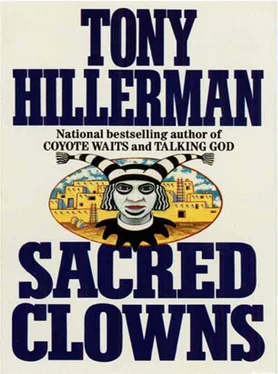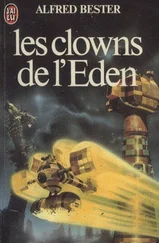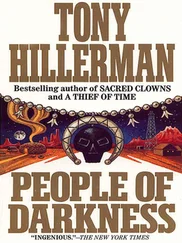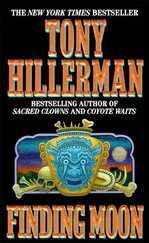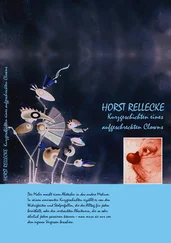Chee was aware that he was not feeling good about this. But he said, “Do you know anybody who owns a pickup that’s green?”
“Sure. My grandfather. His pickup is green.”
“Where does your grandfather live?”
The boy pointed over the hood, at the house of Clement Hoski.
“Have you come to see your grandfather?”
“I live there,” he said. “Me and Grandfather Hoski, we live there.” The boy laughed, a sound full of absolute delight. “Sometimes he lets me do the cooking. I cook eggs in the morning. And I make oatmeal. And I make tortillas. And Grandfather Hoski is going to show me how to make a pumpkin pie, and mutton stew. And how to roast piñon nuts.”
“Your mother and dad? They live there, too?”
The boy looked puzzled. “They’re gone,” he said. “It’s just me and Grandfather. He’s my friend. He goes to work and I go to school and then when we get home he teaches me how to read, and about numbers, and then we play games, with cards, and at the end of the week we do things together. We hunt rabbits and sometimes we go look at things.”
“In his green pickup truck?”
The boy laughed, utterly delighted. “It’s green. He lets me drive it. When we are way out on the dirt roads. He says I’m going to be a great driver.”
“I’ll bet you will be,” Chee said. He took a deep breath. “Where does he keep it?”
The boy looked at Chee, puzzled.
“The truck. Where does he keep the truck?”
“Up there behind the house. It’s there between our house and the old empty place where we keep things. You want to go see it? I’ll show you. It’s pretty.”
“Your name’s Ernie, isn’t it?”
“Ernie,” he agreed, nodding. “Grandfather had my name printed and put it on the back of our truck. You want to see it?”
“Not now,” Chee said. “I want to think about it.”
JOE LEAPHORN hadn’t had much sleep. He had stayed up late – sitting in what they had called their guest bedroom in the days when Emma had been alive and they had entertained guests. Now it had become, slowly and with no real planning, Leaphorn’s office away from his office. The guest bed had become the flat surface on which things that needed to be spread could be spread. On it, Leaphorn had arranged airline timetables, railroad timetables, maps of China, maps of Mongolia, an assortment of the odds and ends one needs to plan a trip when you’re half-afraid of taking it. Contrary to Leaphorn’s nature, this business had become rushed and hurried – last-minute planning. In just two days he would meet Louisa at the Flagstaff airport. They would fly down to Phoenix, thence to Los Angeles, and from there it would be off to another world – to Peking. Beijing , Leaphorn thought. I have to remember that . Louisa had made reservations for them at the Tianlun Dynasty for the three days they would be there. “ They’re so expensive,” Louisa had said. “I thought we could share a room.” And into the silence she had added, “It has two beds in it .” These three days were to allow him time to work his way through any bureaucratic snarls that going north into Mongolia might entail, and to allow her the time she needed in the Beijing libraries, and to meet with the folklorists with whom she had been working. “ And to allow us a little time just to be tourists.” She had reached over and squeezed his hand as she said it, looking intensely happy. As happy as a child. He had been touched, and was touched now, remembering it. “You’ve got to see Mao’s Tomb, the old Summer Palace, and the Friendship Store. The world’s wildest variety store .” He looked at the map again. After Beijing he would head northwestward to Ürümqi and Turpan, where Louisa had written to a linguist and other scholars and made reservations for him, and she would head south to Xian, and Nanjing, and more meetings with her fellow citizens in the small world of folklorists. Then they would meet again in Shanghai for the trip home together.
He had spent almost two hours reading through the guidebooks she had loaned him, working out the best schedule he could – disgruntled because it had to be based mostly on guesswork. And then he had started packing. “ Layers,” she had advised him. “That’s the secret in China. It seems like it’s always cold outside and too hot inside. So take sweaters, and long johns, and some stuff you can peel off. And don’t take too much because it’s easy to get stuff washed. And you are the right size. You can buy Chinese clothing.” She had studied him, smiling. “In fact, I think you could pass for Chinese. Especially up in the north where you’ll be .”
He had pushed the maps aside to make room for his suitcase, folding in shorts, and undershirts, and socks, and in the process uncovering his pajamas. Emma had bought them for him. She had bought him his first set for his birthday two weeks after their marriage, looking at him shyly as he opened the package, wondering how he would take this hint. He had worn pajamas for years in deference to Emma’s modesty, and gradually had become used to them, and to receiving a gift-wrapped new pair whenever a present was appropriate and the previous pair had worn thin. But Emma had died. There had been no more new pajamas then. No more wearing the old ones. Putting them on had provoked far too many memories.
He had picked them out of the drawer, inspected them, and found them in fair condition. A little tight around the stomach, as he remembered, but he had lost a little weight eating his own cooking. One room with two beds. He’d folded them in. And then he had been overpowered by the desolation of this empty, silent house, and the knowledge of loss and loneliness. He had gone out into the darkness, and walked up the gravel street. When he became aware that his feet were hurting, he sat on a boulder where he could watch the last half of the moon rising over the ridge east of Window Rock, and the occasional car rolling down the highway toward Fort Defiance. Finally, when even the highway was silent and the moon was high and the cold had seeped up his pant legs and down the back of his jacket, he got up and walked stiffly home.
In his real office now he felt the lack of sleep. He glanced at his in-basket. It had collected a stack of notes and mail in the days he’d spent working at Thoreau and Tano. But that stack could wait. So could everything else except the Eric Dorsey homicide. He had just a day left to work on that before he left.
He picked up the telephone receiver and buzzed Chee’s number. He’d talk to Chee about what he’d learned at Tano. If nothing else, it would help him judge Chee’s intelligence. The memo Chee had left him showed good instincts. He’d sensed that the people at Tano had seen something Chee had missed. Maybe the boy would come up with something from the Lincoln Cane business.
But Chee didn’t answer his telephone. Leaphorn buzzed Virginia.
“Just a minute,” she said. “I think there’s a note in the overnight file.” The minute passed. “He called in. He said he’s been working on that Todachene vehicular homicide case. He said he has to take the rest of the week off. He’s going to charge it to his annual leave time.” Virginia’s tone had become disapproving. “I didn’t see any paperwork on that,” she said. “Did you put through the paperwork?”
“Did he leave a number where I can reach him?”
“There’s not a thing about that here,” she said. “You want me to call the Shiprock office?”
“Please,” Leaphorn said. “And let me know.” It wouldn’t do any good, but it would get Virginia off his telephone.
He hung up, feeling sleepy and disgruntled. This absence-without-permission business exactly fit Chee’s reputation. When the kid had worked out of Tuba City, Captain Largo used to complain about the trouble he had getting Chee to follow regulations. At Crownpoint it had been the same story. There his brains had gotten him acting sergeant stripes when he was still green, and his habit of doing his own thing had gotten him busted just as fast.
Читать дальше
